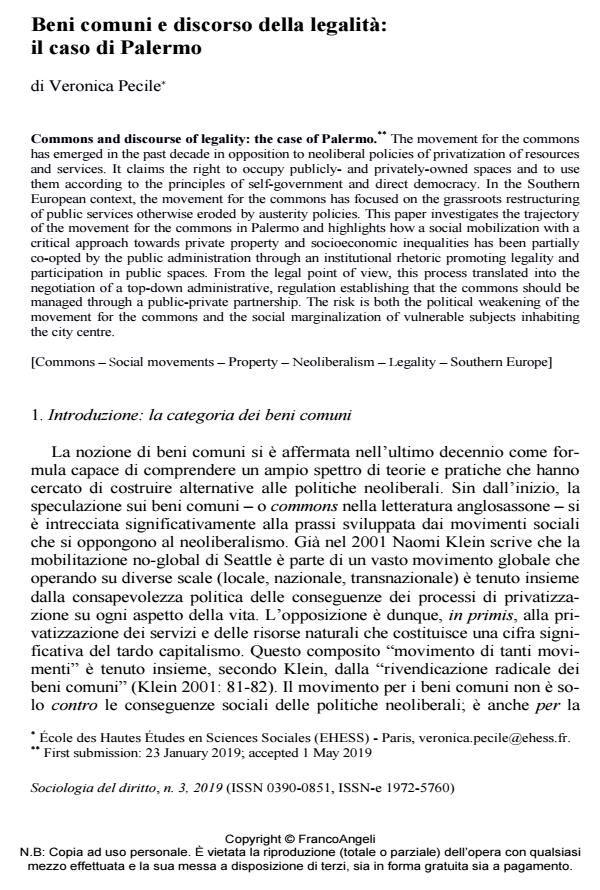Beni comuni e discorso della legalità: il caso di Palermo
Titolo Rivista SOCIOLOGIA DEL DIRITTO
Autori/Curatori Veronica Pecile
Anno di pubblicazione 2020 Fascicolo 2019/3
Lingua Italiano Numero pagine 17 P. 139-155 Dimensione file 278 KB
DOI 10.3280/SD2019-003007
Il DOI è il codice a barre della proprietà intellettuale: per saperne di più
clicca qui
Qui sotto puoi vedere in anteprima la prima pagina di questo articolo.
Se questo articolo ti interessa, lo puoi acquistare (e scaricare in formato pdf) seguendo le facili indicazioni per acquistare il download credit. Acquista Download Credits per scaricare questo Articolo in formato PDF

FrancoAngeli è membro della Publishers International Linking Association, Inc (PILA), associazione indipendente e non profit per facilitare (attraverso i servizi tecnologici implementati da CrossRef.org) l’accesso degli studiosi ai contenuti digitali nelle pubblicazioni professionali e scientifiche.
The movement for the commons has emerged in the past decade in opposition to neoliberal policies of privatization of resources and services. It claims the right to occupy publicly- and privately-owned spaces and to use them according to the principles of self-government and direct democracy. In the Southern European context, the movement for the commons has focused on the grassroots restructuring of public services otherwise eroded by austerity policies. This paper investigates the trajectory of the movement for the commons in Palermo and highlights how a social mobilization with a critical approach towards private property and socioeconomic inequalities has been partially co-opted by the public administration through an institutional rhetoric promoting legality and participation in public spaces. From the legal point of view, this process translated into the negotiation of a top-down administrative, regulation establishing that the commons should be managed through a public-private partnership. The risk is both the political weakening of the movement for the commons and the social marginalization of vulnerable subjects inhabiting the city centre.
Parole chiave:Commons - Social movements - Property - Neoliberalism - Legality - Southern Europe
- The legal field as battleground for social struggle Veronica Pecile, in Oñati Socio-Legal Series /2021 pp.S187
DOI: 10.35295/osls.iisl/0000-0000-0000-1216 - No Future? Die Zukunft Siziliens Miryam Frickel, in PERIPHERIE – Politik • Ökonomie • Kultur /2025 pp.84
DOI: 10.3224/peripherie.v45i1.06 - Reimagining the Urban Commons in Italy Marco Alberio, Charmain Levy, pp.1 (ISBN:978-1-83662-607-7)
- Between urban commons and touristification: radical and conservative uses of the law in post-austerity Southern Italy Veronica Pecile, in City /2022 pp.998
DOI: 10.1080/13604813.2022.2126204
Veronica Pecile, Beni comuni e discorso della legalità: il caso di Palermo in "SOCIOLOGIA DEL DIRITTO " 3/2019, pp 139-155, DOI: 10.3280/SD2019-003007